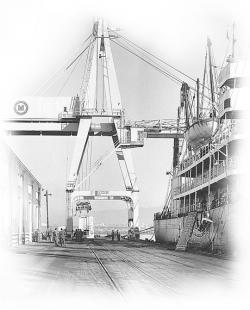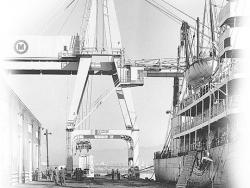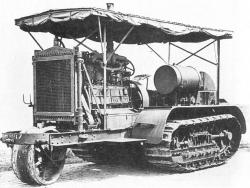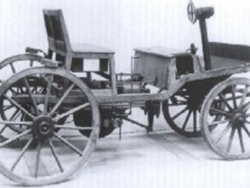Siegfried Marcus (1833-1898), a remarkable engineer and manufacturer, lived most of his life and died in Vienna, leaving his most important legacy — an experimental automobile resembling today's modern car and the oldest extant automobile known worldwide. Marcus' second car, built circa 1875 (a more specific date still being investigated by historians), is believed to be the first vehicle powered by a four-cycle engine and the first to use gasoline as a fuel, featuring the first carburetor for a gasoline engine and the first magneto ignition.
Gasoline

ViennaCountry: AustriaWebsite: http://www.asme.org/about-asme/history/landmarks/topics-m-z/road-and-off-road-transportation/-203-siegfried-marcus-car-%28ca--1875%29Creator: Marcus, Siegfried

The first practical demonstration of this tractor took place in a peat field on Roberts Island on November 24, 1904, and was patented and in production by December of 1907. The existing machine represents the earliest gasoline-powered track-type tractors that were to help revolutionize agriculture, logging, construction, road building, and transportation around the world. Its design and development is credited to Benjamin Holt (1849-1920), president of the Holt Manufacturing Company of Stockton.

The world's first high-speed, dockside container-handling cranes reduced ship turnaround time from three weeks to eighteen hours. They became the model and set the standard for future designs worldwide. In service January 7, 1959, the A-frame cranes built at Encinal Terminals in Alameda, California, were designed to move large quantities of products with less handling, less damage, and less pilferage. Under the leadership of C. Dean Ramsden, P.E., the Pacific Coast Engineering Company (PACECO Inc.) met performance specifications developed by the Matson Navigation Company.
Innovations

The world's first high-speed, dockside container-handling cranes reduced ship turnaround time from three weeks to eighteen hours. They became the model and set the standard for future designs worldwide. In service January 7, 1959, the A-frame cranes built at Encinal Terminals in Alameda,…
Read More
The first practical demonstration of this tractor took place in a peat field on Roberts Island on November 24, 1904, and was patented and in production by December of 1907. The existing machine represents the earliest gasoline-powered track-type tractors that were to help revolutionize…
Read More
Siegfried Marcus (1833-1898), a remarkable engineer and manufacturer, lived most of his life and died in Vienna, leaving his most important legacy — an experimental automobile resembling today's modern car and the oldest extant automobile known worldwide. Marcus' second car, built circa 1875 (a…
Read More

